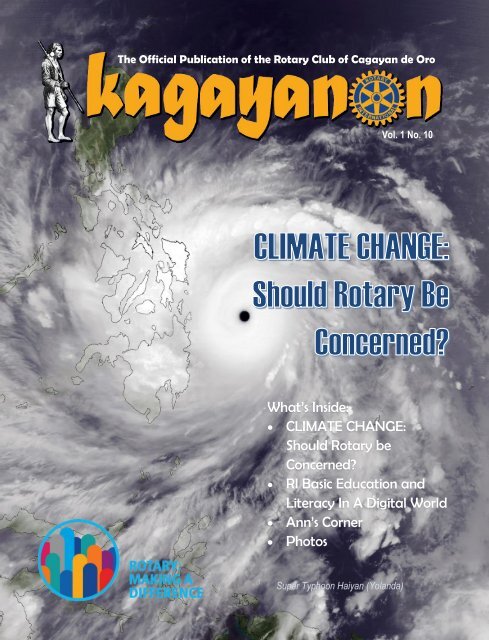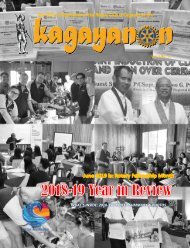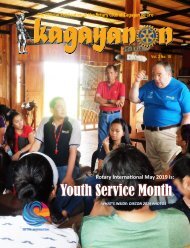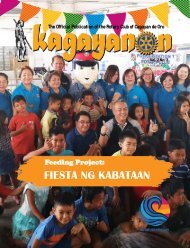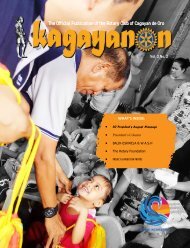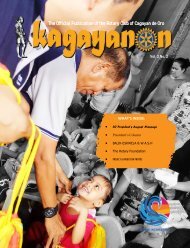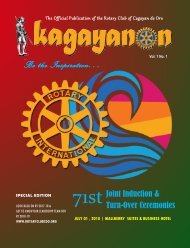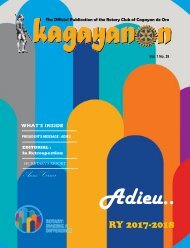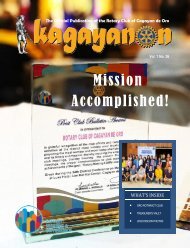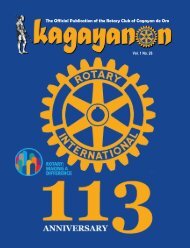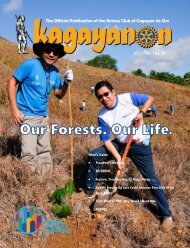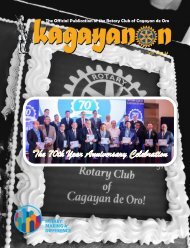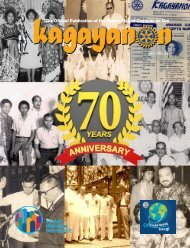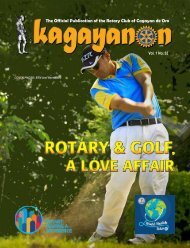RCCDO SEPTEMBER 14 BULLETIN
The Official Publication of the Rotary Club of Cagayan de Oro
The Official Publication of the Rotary Club of Cagayan de Oro
You also want an ePaper? Increase the reach of your titles
YUMPU automatically turns print PDFs into web optimized ePapers that Google loves.
The Official Publication of the Rotary Club of Cagayan de Oro<br />
Vol. 1 No. 10<br />
What’s Inside:<br />
• CLIMATE CHANGE:<br />
Should Rotary be<br />
Concerned?<br />
• RI Basic Education and<br />
Literacy In A Digital World<br />
• Ann’s Corner<br />
• Photos<br />
Super Typhoon Haiyan (Yolanda)
OUR PAST PRESIDENTS<br />
1947-1948 Isidro Vamenta<br />
1948-1949 Isidro Vamenta<br />
1949-1950 Hernando Pineda<br />
1950-1951 Hernando Pineda<br />
1951-1952 Glicerio Floirendo<br />
1952-1953 Hernando Pineda<br />
1953-1954 Johnny Paraiso<br />
1954-1955 Ernesto Tamparong<br />
1955-1956 Nemesio Chaves<br />
1956-1957 Rizal Ortega<br />
1957-1958 Emilio Dayrit<br />
1958-1959 Wadhu Dharamdas<br />
1959-1960 Jesus Larrabaster<br />
1960-1961 Henry Canoy / Climaco Mosqueda<br />
1961-1962 Jesus Larrabaster<br />
1962-1963 Delfin Rabe<br />
1963-1964 Pablo Reyes<br />
1964-1965 Jose Palacio<br />
1965-1966 Briccio Tamparong<br />
1966-1967 Plutarico Velez<br />
1967-1968 Francisco Velez<br />
1968-1969 Dante Sarraga<br />
1969-1970 Miguel Siojo<br />
1970-1971 Rene Fruto<br />
1971-1972 Roberto Nery<br />
1972-1973 Angel Quimpo<br />
1973-1974 Perfecto Casino<br />
1974-1975 Mario Nery / Nestor Fernandez<br />
1975-1976 Casimiro Tamparong<br />
1976-1977 Phil Balan<br />
1977-1978 Benjamin Gorospe<br />
1978-1979 Antonio Valoria / Nazar Chavez<br />
1979-1980 Manuel Samson<br />
1980-1981 Nazar Chaves<br />
1981-1982 Corazon Cid<br />
1982-1983 Jesus Dingcong<br />
1983-1984 Miguel Goking<br />
1984-1985 Marciano Barrera<br />
1985-1986 Salvador Caragos<br />
1986-1987 Pablo Paras<br />
1987-1988 Leo Mabulay<br />
1988-1989 Manuel Aberilla<br />
1989-1990 Stephen Gaisano<br />
1990-1991 Primitivo Bella<br />
1991-1992 Cesilo Adaza<br />
1992-1993 Wenifredo Yancha<br />
1993-1994 Manuel Arceno/Constantino Jaraula<br />
1994-1995 Francisco Sarraga<br />
1995-1996 Constantino Jaraula<br />
1996-1997 Gabriel Evangelista<br />
1997-1998 Jose Gonzaga<br />
1998-1999 Carlos Gorospe<br />
1999-2000 William Walter<br />
2000-2001 Vic Cinco<br />
2001-2002 Raymund Talimo<br />
2002-2003 Carlo Romero<br />
2003-2004 Antonio Soriano<br />
2004-2005 Samson Blanco<br />
2005-2006 Manuel Alinabon<br />
2006-2007 John Mark Sarraga<br />
2007-2008 Edgardo Melchor Palad<br />
2008-2009 Ricardo Gabaon<br />
2009-2010 Manuel Along<br />
2010-2011 Dietmar Schug<br />
2011-2012 Ian Mark Nacaya<br />
2012-2013 Marillo Paano<br />
2013-20<strong>14</strong> Ferdinand Bernasor<br />
20<strong>14</strong>-2015 Luigi Sarraga<br />
2015-2016 Cris Parojinog<br />
2016-2017 Dufel Lagrosas<br />
2
CALL TO ORDER<br />
INVOCATION<br />
PAMBANSANG AWIT<br />
FELLOWSHIP<br />
ROTARY INFORMATION<br />
PROGRAM<br />
PRES. TONYBOY FERNANDEZ<br />
PP SAMMY BLANCO<br />
PP FERDIE BERNASOR<br />
PP PAUL FERRER<br />
PP IAN MARK NACAYA<br />
“Our City Council Today”<br />
SECRETARY’S REPORT<br />
PRESIDENT’S TIME<br />
ADJOURNMENT<br />
PROGRAM COORDINATOR<br />
Editorial Staff<br />
PS MIKE MENDOZA<br />
Editor-In-Chief<br />
Contributors & Members<br />
Pres. Tonyboy Fernandez<br />
PAG John Mark Sarraga<br />
Sec. Neil Que<br />
Dir Leony Quicoy<br />
PD Nasali Cornelio Silava<br />
Ann Angelie Mae Dael<br />
RTN. Maite Sarraga (RC Premier)<br />
Email Us: rccdophotos@yahoo.com<br />
SEC. NEIL QUE<br />
PRES. TONYBOY FERNANDEZ<br />
PRES. TONYBOY FERNANDEZ<br />
RTN JOEL BERNALDEZ<br />
Father in Heaven,<br />
Thank you for watching over me as I<br />
slept through the night. Your hands of<br />
comfort and strength held me as You<br />
watched over me.<br />
Father, I love You. You love me so<br />
much and I am in awe of how amazing<br />
You truly are. As I begin my day, I<br />
simply pray that you walk with me and<br />
lead me where you please. May Your<br />
will be done this day. Amen.<br />
WEEKLY BIRTHDAYS<br />
(September 08—<strong>14</strong>, 2017)<br />
11—Ann PP Ching Sarraga<br />
<strong>SEPTEMBER</strong> 2017<br />
ANNIVERSARIES<br />
01— PP Paul & ANN Ching Ferrer<br />
05—PP Dufel & ANN PP Doris Lagrosas<br />
3
Upcoming Event?<br />
Let Us Cater For You.<br />
Visit Us at: 68 Faustino Neri Street, RER Subdivision Phase 1 ,<br />
Kauswagan , Cagayan de Oro City<br />
Or Call Us: +63 88 880-1808 or +63 917-625-3410<br />
Email: anaskitchen06@gmail.com<br />
4
PRESIDENT’S MESSAGE<br />
President Antonio V. Fernandez, 2017-18<br />
O<br />
nce again , I would like to thank<br />
you for your support to the Club.<br />
I would like to congratulate newly<br />
Inducted Rotarian<br />
Ben Booc and<br />
Rotarian Ronnie<br />
Apdian for coming<br />
back. For everybody’s<br />
information,<br />
Rtn. Ronnie was<br />
the Most Outstanding<br />
Rotarian when<br />
he served as Director<br />
during the time<br />
of PAG John Mark<br />
Sarraga. Surely ,<br />
both will be an asset<br />
to club.<br />
This week , we will<br />
be turning over the<br />
Puerto National<br />
High School Renovated classroom. Our<br />
chairman , PD Tito Mora has informed<br />
me that this will be on Wednesday at<br />
8:00 in the morning. So as you read this<br />
bulletin, this project will already be<br />
done. We will also be implementing , “<br />
Gift of Sight to Children “ . This endeavor<br />
is in close coordination with the<br />
Cagayan de Oro Eyesight Board. The<br />
project entails to give eyeglasses to 30<br />
school children . Thank you to the Rotarians<br />
who willingly donated the glasses<br />
to these children. This will be implemented<br />
at the end of this month. We<br />
are just awaiting the schedule to be<br />
made by PAG Carlo Romero. Definitely ,<br />
our New Generation Forum will be on<br />
September 22, 2017 and the City Youth<br />
Officials on September 25-29 , 2017<br />
I also want to thank PP Deitmar Schug<br />
for his donation to The Rotary Foundation.<br />
His donation has added to the total<br />
contribution of the club of $9,500.00 for<br />
the past 21/2 months. I hope you can<br />
also do your part in helping out whether<br />
it be in Annual giving or in Polio Plus.<br />
Finally , please calendar the Governor’s<br />
Visit to the Club on Wednesday , October<br />
4, 2017 and the Governor’s Address<br />
on October 6, 2017. Your presence will<br />
be highly appreciated. Thank you.<br />
5
SECRETARY’S COLUMN<br />
Secretary Neil Ronard J. Que<br />
W<br />
e had another successful and<br />
productive meeting last Thursday!<br />
Despite the absence of<br />
some officers and Rotarians due to out of<br />
town trips, the club welcomed PNP Region<br />
X PIO Supt. Lemuel Gonda as guest<br />
speaker once again.<br />
Let us congratulate the sponsors and the<br />
club as a whole for two more inductees in<br />
the said meeting. We'd like to welcome<br />
Ben Booc and PD Ronnie Apdian to the<br />
community, and congratulate them as well<br />
for their induction!<br />
Our meeting have indeed grown in number<br />
and have been livelier because of the<br />
support of all members. Should you have<br />
any suggestions for guest speaker to<br />
make our future meetings just as informative<br />
and dynamic, kindly approach any of<br />
the officers or post them in our social<br />
group chats.<br />
A reminder again to everyone to please<br />
make sure your annual dues are settled.<br />
Fifty percent of<br />
total amount due<br />
is already sufficient<br />
at this time.<br />
6
7<br />
WEEKLY MEETING PHOTOS
CLIMATE CHANGE:<br />
Should Rotary Be Concerned?<br />
Source: Rotary.org; Ecowatch.org;<br />
reneekarunungan.com<br />
RI<br />
President Ian Riseley, 2017-18<br />
has made the case that curbing<br />
climate change is essential to Rotary’s<br />
goal of global service. Riseley recently<br />
said, “Environmental degradation and<br />
global climate change are serious threats<br />
to everyone. They are having a disproportionate<br />
impact on those who are the<br />
most vulnerable, those to whom Rotary<br />
has the greatest responsibility.”<br />
The rainy season has come once again<br />
and for many communities in the Philippines,<br />
this means getting ready for<br />
strong typhoons.<br />
This also means evacuation, damaged<br />
crops, and floods. June to September<br />
has always been the months where<br />
typhoons visit the country most but<br />
with changing weather patterns, typhoon<br />
season has extended to November<br />
and December. Typhoon<br />
Yolanda (Haiyan) happened in November<br />
2013, Typhoon Ruby<br />
(Hagupit) in December.<br />
year? Or will we just continue with the<br />
phrase, “The Filipino spirit is waterproof”<br />
for every disaster that will hit us?<br />
Haiyan, Thelma, Ike, Fengshen, Washi,<br />
Durian, Bopha, Trix, Amy, Nina. These<br />
are the 10 deadliest typhoons of the<br />
Philippines between 1947 and 20<strong>14</strong>.<br />
What’s alarming is that five of the 10<br />
have occurred since 2006, affecting and<br />
displacing thousands of citizens every<br />
time. Seven of these 10 deadly storms<br />
each resulted in more than 1,000 casualties.<br />
But the deadliest storm on record<br />
in the Philippines is Typhoon Haiyan,<br />
known locally as Typhoon Yolanda,<br />
which was responsible for more than<br />
6,300 lost lives, more than four million<br />
displaced citizens and $2 billion in damages<br />
in 2013.<br />
The question is, after all the typhoons<br />
we’ve gone through, after all<br />
the lives we have lost, have we<br />
learned our lesson? Are we ready to<br />
face the onslaught of the next 20<br />
typhoons that will come our way this<br />
8
The Philippines has long been particularly<br />
vulnerable to extreme weather. But<br />
in recent years our nation has suffered<br />
from even more violent storms like Typhoon<br />
Haiyan. On average, about 20<br />
tropical cyclones enter Philippine waters<br />
each year, with eight or nine making<br />
landfall. And over the past decade,<br />
these tropical storms have struck our<br />
nation more often and more severely,<br />
scientists believe, because of climate<br />
change. In addition, two factors unique<br />
to the Philippines—its geography and<br />
development—have combined to worsen<br />
both this threat and its devastating<br />
consequences.<br />
The Global Climate Risk Index 2015<br />
listed our country as the number one<br />
most affected country by climate<br />
change. This is thanks, in part, to its<br />
geography. The Philippines is located in<br />
the western Pacific Ocean, surrounded<br />
by naturally warm waters that will likely<br />
get even warmer as average seasurface<br />
temperatures continue to rise.<br />
9<br />
As the ocean’s surface temperature increases<br />
over time from the effects of<br />
climate change, more and more heat is<br />
released into the atmosphere. This additional<br />
heat in the ocean and air can lead<br />
to stronger and more frequent storms—<br />
which is exactly what we’ve seen over<br />
the last decade.<br />
The Philippines also lacks natural barriers;<br />
as a collection of more than 7,000<br />
islands there is almost nothing standing<br />
between us and the sea. In addition to<br />
the coral reefs, one of the best buffers<br />
against typhoons are the Philippine mangrove<br />
ecosystems. These mangroves<br />
help lessen the impact of storm surge<br />
and stabilize soil but have disappeared<br />
by almost due to deforestation.<br />
This is not an easy problem to fix, but<br />
we need to try. The first step is environmental<br />
and climate literacy, with education<br />
as the key. There is still a wide<br />
room for educating the public on what<br />
can be done to balance our daily needs.<br />
Continued, CLIMATE p.15
PHOTO<br />
10
PHOTO<br />
11
By ANN President Angelie Mae Dael<br />
T<br />
he Rotary Anns had our third<br />
GMM last September 7, 2017 at<br />
the Sinamay Room of Seda Hotel.<br />
The September celebrants went to great<br />
lengths to make it an unforgettable<br />
meeting.<br />
Everyone gamely came in the motif of<br />
denims with patches or embellished.<br />
Each had a chance to win cute deniminspired<br />
raffle items. The entertainment<br />
had the Anns dancing to Despacito.<br />
Ann Girlie Mora, PP Yolly Malferrari,<br />
PP Biema Along, Ann Aida Gonzaga<br />
and won a prize each for being Most<br />
Graceful.<br />
On another note, we are enjoining all<br />
Anns to support our Rotarians for the<br />
New Generation Forum on September<br />
20, City Youth Officials on September 25<br />
-30, and the upcoming Gift of Sight Project.<br />
Our visit to the City's elderly members<br />
will be moved to October. Also, we<br />
encourage Anns to join their Rotarians<br />
for the Governor's Address on October<br />
7 at Mallberry Hotel.<br />
We also had a group contest to determine<br />
the most tech-savvy. Group 2<br />
surprised everyone by besting the 3<br />
others. They proved that age is not a<br />
limit to being updated with gadgets<br />
and apps.<br />
The meeting was extra special as we<br />
had 4 first-timers with us: Girlie Mora,<br />
Juliet Empedrad, Allyn Booc, and Tina<br />
Casiño.<br />
It was indeed a September to Remember<br />
and we thank PP Ching Sarraga,<br />
Ann Amy Ceniza and Ann Chona Sarraga<br />
for making it a superbly memorable<br />
GMM.<br />
12
13
L<br />
ast Friday, we join the global community<br />
in celebrating International<br />
Literacy Day, September 08: a day<br />
uniting governments, civil society organizations,<br />
communities, teachers and key<br />
stakeholders to highlight our achievements<br />
in basic education and literacy<br />
while looking ahead on ways to address<br />
remaining challenges.<br />
This year’s theme, Literacy in a Digital<br />
World, focuses on the challenges and<br />
opportunities of promoting literacy in our<br />
increasingly digital world. Digital technologies<br />
continue to drastically changing the<br />
way people live, work, learn and communicate.<br />
Innovative new technologies<br />
provide opportunities for people to easily<br />
access information and knowledge, make<br />
connections around the world, broaden<br />
their reach and change the world in unforeseen<br />
ways.<br />
RI: Basic Education and Literacy in a<br />
Digital World<br />
By Azka Asif, Rotary Service and Engagement staff<br />
Rapid advancements have also resulted<br />
in a global ‘digital divide’: disparities in<br />
access to digital technologies. Today<br />
nearly four billion people around the<br />
world do not have access to the internet,<br />
nearly two billion people do not use<br />
a mobile phone, and almost half a billion<br />
live outside of areas with a mobile signal.<br />
Those who do not have access to<br />
these technologies, or the knowledge<br />
and skills required to navigate them,<br />
end up being left behind.<br />
According to UNESCO, nearly 750 million<br />
adults and 264 million out-of-school<br />
children still lack basic literacy skills<br />
making the divide even larger. Rotary<br />
members are addressing these challenges<br />
by closing the literacy skill gaps and<br />
Continued, LITERACY p.15<br />
<strong>14</strong>
CLIMATE from p. 09<br />
Greater understanding is needed on the<br />
benefits of sustainable resources. Climate<br />
and environmental literacy must be<br />
translated into action and become a way<br />
of life.<br />
What is the difference between<br />
a hurricane, a cyclone,<br />
and a typhoon?<br />
H<br />
urricanes, cyclones, and typhoons<br />
are all the same weather<br />
phenomenon; we just use<br />
different names for these storms in different<br />
places. In the Atlantic and Northeast<br />
Pacific, the term “hurricane” is<br />
used. The same type of disturbance in<br />
the Northwest Pacific is called a<br />
“typhoon” and “cyclones” occur in the<br />
South Pacific and Indian Ocean.<br />
The ingredients for these storms include<br />
a pre-existing weather disturbance,<br />
warm tropical oceans, moisture, and<br />
relatively light winds. If the right conditions<br />
persist long enough, they can combine<br />
to produce the violent winds, incredible<br />
waves, torrential rains, and<br />
floods we associate with this phenomenon.<br />
In the Atlantic, hurricane season officially<br />
runs June 1 to November 30. However,<br />
while 97 percent of tropical activity<br />
occurs during this time period, there is<br />
nothing magical in these dates, and hurricanes<br />
have occurred outside of these<br />
six months.<br />
LITERACY from p. 15<br />
reducing inequalities:<br />
The Rotaract Club of Ulhasnagar Sapna<br />
Garden in India hosted a digital literacy<br />
driveto train on the latest technologies.<br />
Rotaractors taught participants the basics<br />
of getting online using a computer<br />
and a mobile phone. Participants were<br />
taught how to run basic internet searches,<br />
navigate maps, stream videos, and<br />
create and manage online payment accounts.<br />
The Rotary Club of Eau Gallie in the<br />
United States provided a mobile computer<br />
lab for digital literacy training. The<br />
computer lab traveled through the country<br />
providing a course for underprivileged<br />
students. Students completing the<br />
course received a laptop to help them<br />
complete high school, prepare for college,<br />
research vocations and seek employment.<br />
The Rotary Club Chiavari Tigullio in Italy<br />
aimed to bridge the generation gap and<br />
promote literacy among senior citizens<br />
by conducting trainings on using digital<br />
devices. With the support of professional<br />
teachers, 30 young students were paired<br />
with 30 seniors to teach them how to<br />
use devices including computers, tablets,<br />
and mobile phones.<br />
To help bridge the digital divide in their<br />
community, the Rotary Club of Port-<br />
Harcourt Gateway in Nigeria conducted<br />
an 8-week computer literacy training<br />
program for eight underserved children.<br />
The students, between the ages of 6<br />
and10, had no access to computer literacy.<br />
The club hopes to make this an annual<br />
event benefiting even more students<br />
in the future.<br />
15
16
By: Kevin Lui, TIME.com (Sept. 2017)<br />
V<br />
irtually all the world's tap water<br />
is contaminated by microscopic<br />
plastic fibers, a new study<br />
claims, raising fresh concerns about the<br />
implications of rampant plastic pollution<br />
on human and planetary health.<br />
Some 83% of tap water samples collected<br />
from over a dozen countries on<br />
five continents tested positive for microplastic,<br />
according<br />
to a study commissioned<br />
by data journalism<br />
outlet Orb.<br />
The specific rate of<br />
prevalence in different<br />
locales varied,<br />
but all tested locations<br />
— from Europe<br />
to Jakarta and Beirut<br />
— saw plastic found<br />
in over 70% of tap<br />
water samples.<br />
In the U.S., researchers<br />
found that<br />
94% of all water samples — including<br />
tap water from places like Trump Tower<br />
and the Environmental Protection Agency's<br />
headquarters — were contaminated<br />
by plastic.<br />
These microscopic fragments enter the<br />
water system in multiple ways, from<br />
synthetic fiber clothing to tire dust and<br />
microbeads, as well as the fragmenting<br />
of larger pieces of plastic, which for the<br />
most part is non-biodegradable.<br />
With about 300 million tons of plastic<br />
produced annually, the worsening contamination<br />
problem it brings to oceans<br />
and rivers has attracted increasing concern.<br />
Attention has previously focused on<br />
plastic pollution's effect on marine life,<br />
seabirds and the human food chain, but<br />
effects of microplastic's presence in the<br />
human body remain to be studied.<br />
Helpful Link: https://orbmedia.org/<br />
stories/Invisibles_plastics/multimedia<br />
17
MINORITY MEMBERSHIP AND<br />
TOLERANCE OF DIFFERENCES<br />
R<br />
otary formally considered the<br />
issue of racial restriction in membership<br />
and determined that the<br />
organization could not allow racial restrictions<br />
to the organization’s growth. In<br />
Rotary’s legislative deliberations in June<br />
1921, it was formally determined that<br />
racial restrictions would not be permitted.<br />
Non-racialism was included in the<br />
terms of the standard constitution in<br />
1922, required to be adopted by all<br />
member Clubs.<br />
Rotary and other service<br />
clubs in the last<br />
decade became open<br />
to homosexual membership.<br />
Other minorities,<br />
in the face of<br />
general changes in<br />
demographics are also<br />
encouraged to join.<br />
said, “If by interposition of Providence I<br />
someday were to find myself standing on<br />
a platform in some great Coliseum looking<br />
into the eyes of every living Rotarian,<br />
and were to be told that I could have<br />
one word to say, without an instant’s<br />
hesitation and at the top of my voice, I<br />
would shout ‘Toleration!’”<br />
Our founder Paul Harris has repeatedly<br />
iterated: “Rotarians respect each other‘s<br />
opinions and are tolerant and friendly at<br />
all times. Catholics, Protestants, Moslems,<br />
Jews, and Buddhists break bread<br />
together in Rotary.” And it is this tolerant<br />
attitude that prompted the Rotary International<br />
to adopt the following statement<br />
in 1933: “Rotarians in all countries<br />
should recognize these facts<br />
(differences), and there should be a<br />
thoughtful avoidance of criticism of the<br />
laws and customs of one country by the<br />
Rotarians of another country.” Tolerance<br />
is a key to understanding among different<br />
peoples and nations.<br />
Tolerance is one of<br />
the most important<br />
virtues in the Rotary<br />
spirit. As early as 1911<br />
our founder Paul Harris<br />
in his essay<br />
“Rational Rotarianism”<br />
18
19
20


